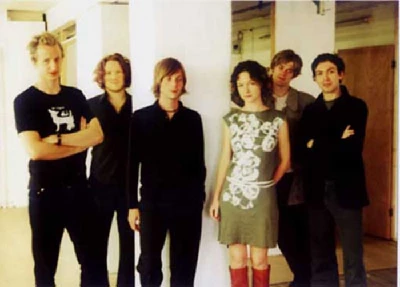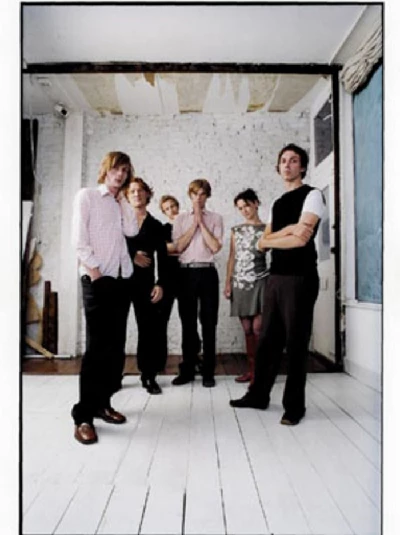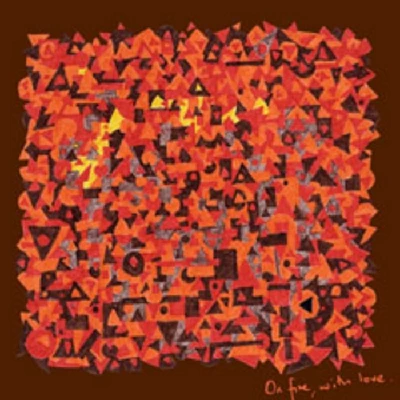published: 22 /
10 /
2006

Nottingham alt. rockers Seachange have just released their second album 'On Fire, With Love' on their own label in Britain and on Glitterhouse in Europe. Frontman Dan Eastop talks to John Clarkson about its difficult recording
Article
‘Second album syndrome’ is a problem that afflicts many bands. After years sometimes of working towards preparing their first album, they then often struggle to find material that is suitable or strong enough for a second record. Nottingham-based sextet Seachange, however, met with an opposing problem when they began work on their just released new album, ‘On Fire, With Love’, the follow-up to their 2004 debut, ‘Lay of the Land’. Rather than having too little material, they had too much of it.
“Whenever I heard that phrase attached to other bands, I always thought of it as writing difficulty and a problem coming up with the ideas” says Seachange’s singer Dan Eastop, talking to Pennyblackmusic. “But with us, if anything, it was that we had too many ideas.”
An alt. rock band, Seachange was formed in the late 90’s by its original members, Eastop (vocals), Simon Aldcroft (guitar), David Gray (guitar), Adam Cormack (guitar), James Vyner (bass) and Jo Woodnutt (violin) when they were students.
“We met when were at university and were friends first” laughs Eastop. “Right at the end of university we decided to play a show together just for a bit of fun. No one was kind enough to tell us that we should quit and so we decided to carry on.”
“We ended up moving in together into an eight bedroom house with a cellar. We put all our musical equipment in the cellar and started really playing properly together. That was when we really started to develop as a band.”
“We were in there for about a year and then it all just became too much. You get to a certain age and you need a bit more of your own space. Adam and Jo had also become partners and wanted to live together and we eventually all moved out to our own places. It was a great time though. We would all go and see gigs together and then we would get home and there would be someone in the cellar playing, and you would go and pick up and play and join them. It was a really creative period.”
After releasing two singles, ‘Superfuck’ and ‘AvsCo 10’ in 2003, the first on the tiny label Radiate and the second on the equally small Gringo Records, Seachange signed a deal with the larger independent label Matador later on that year. They recorded ‘Lay of the Land’ in Nottingham in their own home studio, which they had built using an advance which Matador had given them.
After ‘Lay of the Land’ came out in March 2004, Seachange spent much of that year touring. They supported Mission for Burma on a British tour. They toured Germany where they have become especially popular twice, the first time as support to Electrelane and the second time as headliners. They also went to the United States on two occasions, initially to play the SXSW Festival in Austin, Texas, and then returning a month later where on a three week tour they played gigs on the East coast with the soon-to-disband lo-fi art rockers Guided by Voices on their final dates before they split, and then further dates on the West coast with hardcore punks Pretty Girls Make Graves.
Work first began on ‘On Fire, With Love’ in December 2004. While ‘Lay of the Land’ is a set of intense lo-fi rockers over which Jo Woodnutt’s surging violin spins and weaves, ‘On Fire, With Love’ is a more diverse album. There are still several of the soaring, turbulent rock songs of the last album present on tracks such as ‘Annie, Tacoma’, ‘No Backward Glances’ and album closer ‘In’ , but these are balanced out with an equal number of mellow and more pastoral-sounding pop and folk numbers such as ‘Anti-Story’, ‘Midsummer Fires’ and ‘Youth and Art’, the latter of which takes some of its lyrics from the Robert Browning poem of the same name. With Jo Woodnutt (now Cormack) having taken time out to have a baby and having become “an occasional member”, new recruit, multi-instrumentalist, Neil Wells, is a strong presence, providing blasts of cornet on the opening ‘Annie, Tacoma’ and guitar and keyboards throughout the rest of the album. Eastop’s chattering, stream-of-consciousness vocals meanwhile all have a personal focus, telling of often brief, but always passionate romances, and the band’s travels abroad in both Europe and America.
“That first record was a lot different to this one” reflects Eastop. “It was a lot darker, and more fraught and mysterious. The sounds were a lot denser. It was quite an angst-ridden, young record. We were all very naïve and learning about our instruments and the sounds we could make with them. We toured those songs and we had a great time. It was a great experience, and, whilst we were playing with the likes of Guided by Voices, Electrelane and Pretty Girls Make Graves, we learned a lot about different ways of playing songs and performing. We wanted to write a bunch of songs that were a bit more poppy, a bit more fun, and also a bit lighter.”
“The first record is simply a band from Nottingham” he continues. "It is quite inward-looking, quite introspective. It is quite shy, quite small town, but then, after we went and travelled Europe and the States, we became a lot more outward-looking and a lot more confident and I think that reflects on this second album.”
‘On Fire, With Love’ was recorded in two parts. The first part was recorded at Propogation House Studios, a remote farmhouse studio in Cornwall with Tony Doogan, a Glaswegian producer who had previously worked with Mogwai, Belle and Sebastian and the Delgados. The second part was recorded back home in Nottingham at the band’s own First Love Studios, with Peter Fletcher, a musician who plays in a local act the Escapologists which also features Wells, co-producing with the band.
“We had enough material for several CDs and about 50 ideas for songs” says Eastop about those first sessions. “They ranged from accordion-led, kind of trancy songs to folk-orientated stuff to garage rock to pop stuff. We originally thought ‘Maybe we will put a double record out’ and, when we went to Cornwall with Tony Duggan, we still had this idea of attempting to make a record of that kind of ambition. He really helped us strip away what he thought was the soggy stuff. We had quite a fragmented idea of what we wanted to do, and what he did was come in and offer us a completely different outlook. He made us hone in on a lot of our playing and a lot of our songs. He is not afraid to offer an opinion. I for one really appreciated that because the way we write songs as a band is often very diplomatic. He was quite forceful and I gained a lot from working under that pressure.”
“I think that it would be fair to say that it was mixed recording” Eastop reflects honestly, talking with hindsight about the results. “There are songs that came out of those three weeks which were very much a success and they’re there on the record, but there are others which weren’t quite right. We were rushing ourselves. We wanted to go down there and get as much done as possible. We recorded 16 songs when we were there. We actually set up another studio of our own whilst we were in Cornwell, so, whilst other people were tracking, we were recording other songs as well.”
“What happened was when we got back from Cornwell was we took the songs to Matador” he adds. “And they didn’t feel that for lots of reasons that the songs were strong enough. At the time I was a big aggrieved, but then after a time I took a good look at it and now I think they were right. There were four or five tracks which we had come back with which just weren’t good enough. They weren’t written or arranged well enough.”
“We had a good think about things and were quite hard on ourselves” he says, moving on to talk about the secondary sessions in Nottingham. “That was when Neil became a lot more involved with us. Joanna had had her baby by that stage. Neil came in and really helped put a good perspective on things. He helped us reshape things and so we spent a lot of last year going through stuff, remixing it, re-recording some of it and then also recording some new stuff as well. We re-recorded some songs live in our studio. We just wanted to get that kind of immediacy, that sound of us playing in a room together again, which we felt was lacking on some of the songs we had recorded originally in Cornwell. ‘On Fire, With Love’ could definitely be seen as having two phases really.”
With Seachange’s deal with Matador having collapsed, the eleven song ‘On Fire, With Love’, which consists of four songs from the sessions with Tony Duggan, and another seven songs from the subsequent sessions in Nottingham, was released by the German label Glitterhouse in Europe in May. It has since gone on to become that long-standing label’s bestselling release since they co-released with Sub Pop some of Seattle grunge rockers Mudhoney’s first albums in the early and mid 90’s. Back home in Britain, where their own contacts are stronger than those of Glitterhouse, Seachange released ‘On Fire, With Love’ on their own A is for Artist label in October. A limited edition mini album, ‘Field, Chaos and Brown’, which also has come out on A is for Artist and features another eight songs from the Cornwell sessions, was released at the same time.
“There have been several” says Eastop, when asked about his favourite moments with Seachange to date. “I really loved played with Electrelane. They are an amazing band. I think that they are just incredibly under rated and I can’t understand why they aren’t hugely famous. That was brilliant. I remember playing at a big outdoor festival in Munich with thousands of people visible. We were playing in the sunset and that was special too. The Bowery Ballroom in New York with Guided by Voices when they played their last ever show was special as well. Bob Pollard (GBV’s frontman and main songwriter for nearly 20 years-Ed) told us beforehand that it was going to be their final gig together, and we got incredibly drunk with them afterwards which was fantastic. There have been a lot of great moments, but many of them come though when you’re together and you’re writing songs and ideas just happen.”
Eastop and Seachange’s focus though is very much on the present and the future rather than the past. While the circumstances of several of its members, who are now all in the late 20’s, have changed over the last year or so, Seachange remains a priority for all of them. Having been successful in Europe and America in particular, they now hope to develop a higher profile in their own country, and also have begun working on their third album.
‘There are lots of things people are doing personally as well as musically” says Eastop in conclusion. “The way the band is working and operating is changing. We used to be absolutely 100 miles an hour, but life changes and people have got babies. They have started businesses and have got other things going on. We are writing new material at the moment and now that Neil Wells is with us he is writing a lot of things and is actually spearheading the new material at the moment. His way of working and the sounds he are making are very different, so we are evolving and starting to move on musically again. I would really like ‘On Fire, With Love’ to get some kind of interest in this country as well as abroad. It would be nice for the album to go quite well here. There are lots of people who are interested in what we do and our songs do get played on the radio, so we are hopeful there. Our main aim for Seachange now is to adjust and to continue functioning and to keep doing new things.”
After a difficult year last year, it seems that Seachange are very much firmly back on track.
Picture Gallery:-

